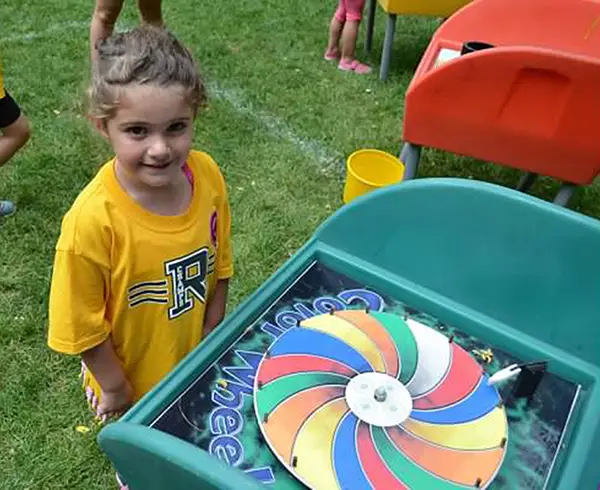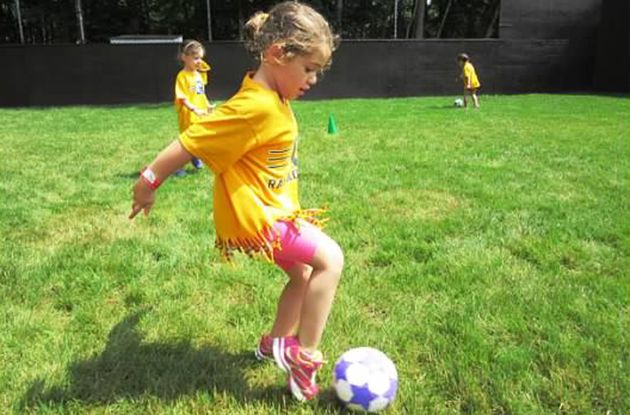“She had swim instruction, which she really liked, and liked her counselors,” Elyssa says. “I think the camp did everything they could to make sure the campers enjoyed themselves.”
The Dunleavys had heard Elyssa’s cousin raving about Camp Ramaquois in Pomona, where she sent her three kids. The couple looked at their outgoing and mature 4-year-old and decided she was ready to attend day camp five days a week from 9am to 4:30pm.
Before attending, Emilie watched promotional Camp Ramaquois videos, visited the premises during an open house in the winter, and felt excited to see her cousins on a regular basis there. At camp, Emilie learned how to swim, slid down on a zipline, made new friends, and overall had a great time. But once camp ended, she voiced a different opinion—namely about the means of transportation.
In order to get to the camp, Emilie had to take an hour-long bus ride from her home in the Riverdale section of the Bronx to Pomona, in Rockland County. She would board the bus between 7:30am and 8am and get home between 5:15pm and 5:20pm each day, which can be tiresome for a preschooler.
“There were days where she was like, ‘I don’t want to go to camp,’ but once she got to camp, she loved it,” Elyssa says. “It was just the process of getting her there that was a bit challenging.”
Once camp was over in August, the Dunleavys were told that they had to submit a deposit for the following summer. They thought the decision was a no-brainer: Of course Emilie would return for another summer of fun. However, Emilie told her parents, “I am never going back there,” and “I hate that place.” They suddenly were faced with the decision of whether to enroll her for the next summer.
RELATED: Find a Day Camp for Your Child
A Common Camp Problem
The Dunleavys were far from alone in their dilemma, whether they knew it or not. For many kids, hesitant or reluctant feelings are normal when it comes to discussing camp, experts say.
Peter Scales, who has a Ph.D. in child development and family relations, is a development psychologist and senior fellow at the Search Institute, an organization that studies education and youth development. He advised asking your child what might happen and how she will feel at camp.
“If the child is wiling to describe any of that, you might uncover some unrealistic fears, as well as realistic concerns,” Dr. Scales says. “[Acknowledge] that, yes, uncomfortable and unpleasant things sometimes do happen, so the child never feels like her concerns are being dismissed or belittled.”
It is key to try to figure out if your child’s fears and resistance are based on specific incidents or other realistic issues, or whether they come from those unrealistic fears or everyday anxieties. Bob Ditter, M.Ed., LCSW, a child and family therapist who has appeared at national and regional conferences with the American Camp Association, suggests assessing your children before deciding to send them to camp. For example, if they have a sick family member, their parents are going through a divorce, or they have any other emotional insecurities, it is best to talk to them about their concerns first.
“Camp can be wonderful and can give kids a wonderful, fresh start and really kind of help them grow in a lot of ways,” Ditter says. “But it’s not meant to be a replacement for some kind of deeper, emotional need or attachment problem.”
RELATED: Find a Specialty Camp for Your Child

Emilie Dunleavy's parents knew she had fun during her first summer at camp, so why was she reluctant to go back for another summer of fun? The bus ride. |
Finding the Right Camp for Your Child
Ditter advises parents to search for camps with a staff that will have a nurturing demeanor.
“There has to be a nurturing staff, so people who are willing to take the time to talk with kids or hang out with kids or to really be with kids and help to facilitate their making friends,” Ditter says. “It’s got to be, for example, a male staff that’s not just all athletic and all gung-ho, but can also be nurturing as well. That’s true for the female staff as well.”
Ditter also recommends that parents turn to their network of friends or colleagues to discuss whether their children felt reluctant about camp and how they overcame it. Or, ask the camp staff to arrange a meeting with other parents at the camp to hear about their children’s experiences. If there is a deeper issue involved, children can see a family therapist or child psychologist to practice going to camp, regardless of whether it is day camp or sleepaway. Ditter says parents should start having these conversations with their children as early as November.
“I think both parents and the child have to basically wrap their brain around [getting] used to [camp], start practicing, start talking to people, start getting used to the idea,” Ditter says.
Non-verbal signals that children may display if they are uncomfortable about the idea of camp include suddenly becoming quiet, withdrawn, or irritable and cranky after a conversation about camp.
“It’s entirely possible that kids can be outwardly agreeable, or at least verbally agreeable, and non-verbally shy about [camp],” Ditter says.
And if a child is strongly against attending camp, the best thing to do may be to listen to them and try again for the following summer. “What I tell parents is I’d rather your child go and be successful than have them have a disastrous experience and then turn them off to camp in the future,” Ditter says.
As for the Dunleavys, they decided to go ahead and pay that deposit for the summer of 2016. They were able to spark Emilie’s excitement in camp again by letting her express her frustration with the commute to camp, and then deciding to stop talking about it altogether for a while. One night, they came across the camp video and made a movie night out of it by popping popcorn and asking her to talk about her fun experiences. Since then, she has asked to watch the video a couple more times.
Despite Emilie’s early reluctance, her parents are hoping and expecting that these happy memories and the excitement of another summer at camp will only grow as the summer approaches.
RELATED: Get Weekend Activities Delivered to You







